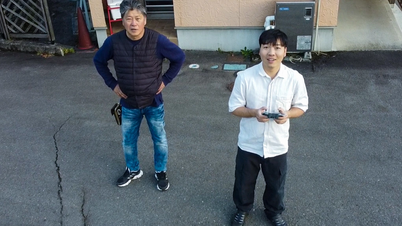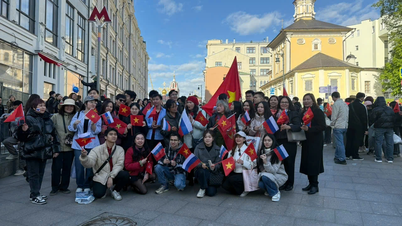"December 2023, so it's already the last month of the year. In just a moment, four winters have passed in Japan. I don't know how it is at my parents' house, because it's been four years since I've been home for Tet...", Mr. Vu, a worker in Japan, choked up.

Many workers in Japan are still hesitant about returning home for Tet amid the devaluation of the yen and rising living costs (Illustration: Nguyen Vy).
Tet but not happy
Do you remember 2 years ago, when New Year's Eve was approaching, Dang Van Vu's mother (25 years old, from Gia Lai) called urgently: "Are you coming home for Tet?"
Vu, in tears, replied to his mother: "I probably won't be able to come back, Mom. I'm so busy this year." At that time, Vu was trying to suppress the pain from a work accident a week before the 2021 Lunar New Year.
He suffered a broken nose and a concussion to his right thigh when concrete fell on him. With his face covered in bandages, he could only cover the camera as he welcomed the New Year on his phone with his family.
"It was a sad Tet. Every time my parents asked me if I was coming home, I just hesitated and made up excuses. The truth is that such trips are very expensive, I want to save money to take care of my parents," Mr. Vu confided.
Mr. Vu came to Japan to work 4 years ago. Due to the busy and hard work, the income has now decreased, and the cost of living has increased, Mr. Vu had to "escape" his hometown.
Previously, Mr. Vu worked as a construction machine operator. In his fourth year working in Japan, he switched to working as an auto maintenance worker with a salary of 17 man/month (about 27.7 million VND), plus bonuses twice a year.
According to Mr. Vu, 2 years ago, the Japanese Yen was still at a rate of over 204 VND/yen, but now it is only about 165 VND/yen. Therefore, the amount of money he sends home to his family has also decreased from 25 million to 17 million/month. However, to be able to send his mother 17 million VND, he has to live as "austerely" as possible.
Not only that, the high cost of living, especially food, has made the life of Vietnamese workers in Japan like Mr. Vu even more difficult. Spending up to 5 man/month (equivalent to 8.1 million VND), the amount of money Mr. Vu has saved up to send back home is not much now.

The amount of money sent home has decreased, many workers choose to celebrate Tet away from home to save costs (Illustration: Son Nguyen).
Like Mr. Vu, Mr. Nguyen Gia Quan (27 years old, from Hanoi) has been living and working in Japan for more than 5 years. As an engineer, Mr. Quan said that although his income is quite high compared to the general level, he still has to struggle to send money back home in the context of the devaluation of the yen. For workers who go to Japan as trainees, according to Mr. Quan, the challenge is even greater.
"My income has decreased by more than 10 million VND, from over 30 million VND to 20 million VND/month. The exchange rate fluctuations do not affect Japanese people too much, but we Vietnamese workers have a big headache. The company has started to lay off employees or at least cut working hours, and workers are no longer allowed to work overtime like before," said Mr. Quan.
No amount of money can compare to... Tet in the countryside
Recalling his early days in Japan, Mr. Vu had a dream of changing his life and paying off his family's debt. At that time, he lived in Niigata Prefecture, one of the places with the most snow in Japan. There, the summers were extremely hot and the winters were freezing cold, and Mr. Vu's skin turned from rosy to dark because of the hard work.
In Japan, he learned many things, from knowledge, skills as well as professional behavior of Japanese people. He himself secretly thanked the country for giving him the opportunity to make money.
However, he left his hometown with so much determination and hope to change his life, but at this time, he only wanted to save enough money and return to his hometown to live a more peaceful life. Above all, he also "craved" the smell of Tet in his hometown that he had missed for so long.

Despite learning many things and opening up opportunities to earn money, many Vietnamese workers in Japan still look forward to the day they save enough money to return home (Illustration: EPA Nursing Program).
Seeing his parents' hair starting to turn grey, he realized that he didn't have much time left. Although life abroad was currently difficult, Vu was determined to return home this Tet to celebrate New Year's Eve with his family.
Besides Mr. Vu, many other Vietnamese workers in Japan are still wondering whether to return or stay during Tet this year. Nhu Truc (23 years old, from An Giang province) went to Japan to work at the age of 21, dropping out of university to work and earn money.
The 23-year-old girl is afraid that this year she will have to celebrate Tet away from home because she is not well-off, in the situation of the Yen devaluation, and the high cost of living. There are months when the money Truc sends home to her family, which is already low, is now even more difficult. This makes the girl quite disappointed compared to her original wish, because the current value of the Yen is low compared to the amount of hard work.

Nhu Truc (in black shirt) celebrated Tet away from home with her compatriots in Japan (Photo: NVCC).
Every day, Truc starts work from 6pm to 9am the next morning. Truc is working at a food company, specializing in cooking and processing canned meals, with a salary of 22-25 million VND/month. This amount includes overtime, because Truc has to work overtime to have enough money to cover her living expenses and send money home to her family as planned.
In recent years, the number of Vietnamese workers going to Japan to work has accounted for over 50% of the number of workers going to work abroad each year. As of December 2022, the total number of Vietnamese workers currently living and working in Japan is 345,000.
Among the 15 countries sending interns to Japan, Vietnam is the leading country in both the number of interns entering the country each year and the number of interns currently practicing in this country.
Currently, there are more than 200,000 Vietnamese interns doing internships in Japan (accounting for more than 50% of the total number of foreign interns in Japan).
Source link







![[Photo] Sparkling lanterns to celebrate Vesak 2025](https://vphoto.vietnam.vn/thumb/1200x675/vietnam/resource/IMAGE/2025/5/7/a6c8ff3bef964a2f90c6fab80ae197c3)





















![[Photo] Prime Minister Pham Minh Chinh chairs meeting to review preparations for trade negotiations with the United States](https://vphoto.vietnam.vn/thumb/1200x675/vietnam/resource/IMAGE/2025/5/6/1edc3a9bab5e48db95318758f019b99b)
































































Comment (0)